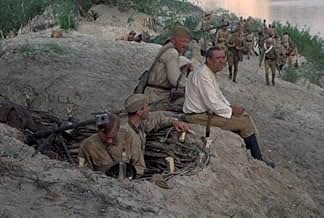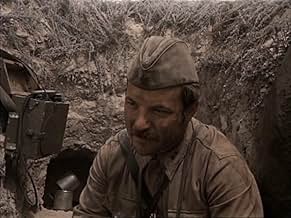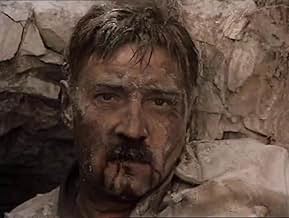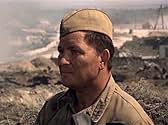CALIFICACIÓN DE IMDb
7.7/10
3.5 k
TU CALIFICACIÓN
Las tropas rusas prometen evitar que el ejército alemán tome Stalingrado.Las tropas rusas prometen evitar que el ejército alemán tome Stalingrado.Las tropas rusas prometen evitar que el ejército alemán tome Stalingrado.
- Dirección
- Guionistas
- Elenco
- Premios
- 3 nominaciones en total
Lidiya Fedoseeva-Shukshina
- Glikeriya
- (as Lidiya Fedoseeva)
- Dirección
- Guionistas
- Todo el elenco y el equipo
- Producción, taquilla y más en IMDbPro
Opiniones destacadas
Russian production. Genre ; WW 2 drama.1975. Based on the novel by Mikhail Sholokhov.
Screenplay and direction by Sergei Bondarchuk with Vasili Shukshin ( as Poitr Lopakhin ), Vyaheslav Tikhonov ( as Nikolay Strltsov ), Sergei Bondarchuk ( as Ivan Zvyagintsev ), Georgi Burkov ( as Alexandr Kopytovskij ), Nikolai Gubenko ( as the Lieutenant ), Yuri Nikulin ( as Nekrasov ), Ivan Lapikov ( as Poprischenko ) & Nonna Mordyukova ( as Natalya Stepanova ).
The film is based on the book by Nobel Prize winning author Mikhail Sholokhov. The action is set in Russia in July of 1942. The exhausted Soviet army was in full retreat against the might of the invading German Panzer divisions. A decision is to hold a ridge with what is left of an infantry regiment near a small village on the banks of the River Don, to allow the exhausted remnants of the army enough time to withdraw across the river and help fortify Stalingrad for the decisive battle that must come.
The loss of Russian life during the campaign was horrific and while there are some impressive set battle pieces, the film concentrates on the exploits of half a dozen or so soldiers from the shattered regiment, who must not retreat even in the face of the Panzers' greater fire power. The film depicts the thoughts and fears of the individual soldiers in the face of the impending battle, and their thoughts of their Mother Russia as well.
While the battles rage, the viewer is not only shown the inhumanity of the conflict, but also the strong personal bonds that develop between comrades in arms in a deadly conflict. There is also plenty of humor in the script, even if it is often grim and tinged with violent overtones. Vasili Shukshin ( as Poitr Lopakhin ) takes the acting honors, with a character that is as much larrikin as it is proletariat.
Screenplay and direction by Sergei Bondarchuk with Vasili Shukshin ( as Poitr Lopakhin ), Vyaheslav Tikhonov ( as Nikolay Strltsov ), Sergei Bondarchuk ( as Ivan Zvyagintsev ), Georgi Burkov ( as Alexandr Kopytovskij ), Nikolai Gubenko ( as the Lieutenant ), Yuri Nikulin ( as Nekrasov ), Ivan Lapikov ( as Poprischenko ) & Nonna Mordyukova ( as Natalya Stepanova ).
The film is based on the book by Nobel Prize winning author Mikhail Sholokhov. The action is set in Russia in July of 1942. The exhausted Soviet army was in full retreat against the might of the invading German Panzer divisions. A decision is to hold a ridge with what is left of an infantry regiment near a small village on the banks of the River Don, to allow the exhausted remnants of the army enough time to withdraw across the river and help fortify Stalingrad for the decisive battle that must come.
The loss of Russian life during the campaign was horrific and while there are some impressive set battle pieces, the film concentrates on the exploits of half a dozen or so soldiers from the shattered regiment, who must not retreat even in the face of the Panzers' greater fire power. The film depicts the thoughts and fears of the individual soldiers in the face of the impending battle, and their thoughts of their Mother Russia as well.
While the battles rage, the viewer is not only shown the inhumanity of the conflict, but also the strong personal bonds that develop between comrades in arms in a deadly conflict. There is also plenty of humor in the script, even if it is often grim and tinged with violent overtones. Vasili Shukshin ( as Poitr Lopakhin ) takes the acting honors, with a character that is as much larrikin as it is proletariat.
As a tradition for Soviet movies, most of the actors here are theatrical actors and their interaction on the screen is nothing if not realistic and natural. But Shulshin's talent makes him rise above others.
If that's not enough you have Nikulin, who was a war veteran himself, in one of his dramatic roles.
If that's not enough you have Nikulin, who was a war veteran himself, in one of his dramatic roles.
A major war movie, with an intimate sight on a Soviet regiment that is fighting back invading Nazi troops while retreating. Another interesting issue that is portrayed here are their relations with local peasant people, whose feelings towards retreat are well explored by the script too. Anyway, the greatest merit of this film are the war scenes, very well done, quite realistic.
Sergei Bondarchuk is a great director. He has proved it with War and Peace, with Waterloo and now again with They Fought for Their Moterhland.
The film looks great. It's amazing how Bondarchuk can translate a world to film and still make it feel very real. The production is great, except for some minor things (tank turrets don't move). When I watched this film, I got the feeling that the whole world was at war. Not only these soldiers somewhere in Russia, but that they were just small parts in a big world conflict.
Most people always complain about the acting in Russian movies. That doesn't go for this one. It all feels very natural. The pain they show looks real, their sweat is there and I cannot imagine it with other actors (or acting method). Sergei Bondarchuk himself plays a role and he shows that he cannot only direct, but also act.
What I loved the most, is that this film shows war as I think it is. There are humans, the enemy is just a dot far away and every fight there are losses. Russians and Germans bleed alike. The Soviet flag is shown and it's clear who we are supposed to root for, but the main characters aren't heroes. They fight because they are told too, not because they are tough.
The music is like the music of War and Peace; not really pleasant to listen to, but it's perfect for the film. When an act of horror is shown, voices rise as if they complain. A requiem to humanity.
They Fought for their Motherland is bit like Spielbergs Saving Private Ryan; only without the misplaced heroism and with that touch of humanity.
Maybe not for everyone (since their is a delicate balance between spectacle, humanity and of course philosophy), but when you are looking for more aspects of war than just the heroic stereotype combat, go for this.
The film looks great. It's amazing how Bondarchuk can translate a world to film and still make it feel very real. The production is great, except for some minor things (tank turrets don't move). When I watched this film, I got the feeling that the whole world was at war. Not only these soldiers somewhere in Russia, but that they were just small parts in a big world conflict.
Most people always complain about the acting in Russian movies. That doesn't go for this one. It all feels very natural. The pain they show looks real, their sweat is there and I cannot imagine it with other actors (or acting method). Sergei Bondarchuk himself plays a role and he shows that he cannot only direct, but also act.
What I loved the most, is that this film shows war as I think it is. There are humans, the enemy is just a dot far away and every fight there are losses. Russians and Germans bleed alike. The Soviet flag is shown and it's clear who we are supposed to root for, but the main characters aren't heroes. They fight because they are told too, not because they are tough.
The music is like the music of War and Peace; not really pleasant to listen to, but it's perfect for the film. When an act of horror is shown, voices rise as if they complain. A requiem to humanity.
They Fought for their Motherland is bit like Spielbergs Saving Private Ryan; only without the misplaced heroism and with that touch of humanity.
Maybe not for everyone (since their is a delicate balance between spectacle, humanity and of course philosophy), but when you are looking for more aspects of war than just the heroic stereotype combat, go for this.
In July 1942, in the Second World War, the rearguard of the Russian army protects the bridgehead of the Don River against the German army while the retreating Russian troops cross the bridge heading to Stanlingrad. While they move back to the Russian territory through the countryside, the soldiers show their companionship, sentiments, fears and heroism to defend their motherland Russian.
"Oni Srazhalis za Rodinu" a.k.a. "They Fought for Their Country" is a realistic war movie, with action and drama very well balanced. The greatest flaw in the screenplay is the usual exaggerated propaganda of the heroism of the soldiers, but it is nothing offensive to the viewer. This film has not been released in Brazil on VHS or DVD and I watched an unofficial DVD that skips the subtitles for long periods and consequently many dialogs are lost. My vote is eight.
Title (Brazil): "Eles Lutam por Sua Pátria" ("They Fight for their Motherland")
"Oni Srazhalis za Rodinu" a.k.a. "They Fought for Their Country" is a realistic war movie, with action and drama very well balanced. The greatest flaw in the screenplay is the usual exaggerated propaganda of the heroism of the soldiers, but it is nothing offensive to the viewer. This film has not been released in Brazil on VHS or DVD and I watched an unofficial DVD that skips the subtitles for long periods and consequently many dialogs are lost. My vote is eight.
Title (Brazil): "Eles Lutam por Sua Pátria" ("They Fight for their Motherland")
¿Sabías que…?
- TriviaThis was the last film of Vasiliy Shukshin.
- ErroresDuring the first battle, a few of the Germans are carrying MP44 (or STG 44) assault rifles. This film takes place in summer 1942 and those rifles were not in service in the German army (even as prototypes) until over two years later.
- Citas
Ivan Zvyagintsev: May our love towards our country live in our hearts as long as we live.
Ivan Zvyagintsev: May our hatred to enemy always shine on the tips of our bayonets...
- ConexionesFeatured in Sergey Bondarchuk (1982)
Selecciones populares
Inicia sesión para calificar y agrega a la lista de videos para obtener recomendaciones personalizadas
- How long is They Fought for Their Country?Con tecnología de Alexa
Detalles
Contribuir a esta página
Sugiere una edición o agrega el contenido que falta

























